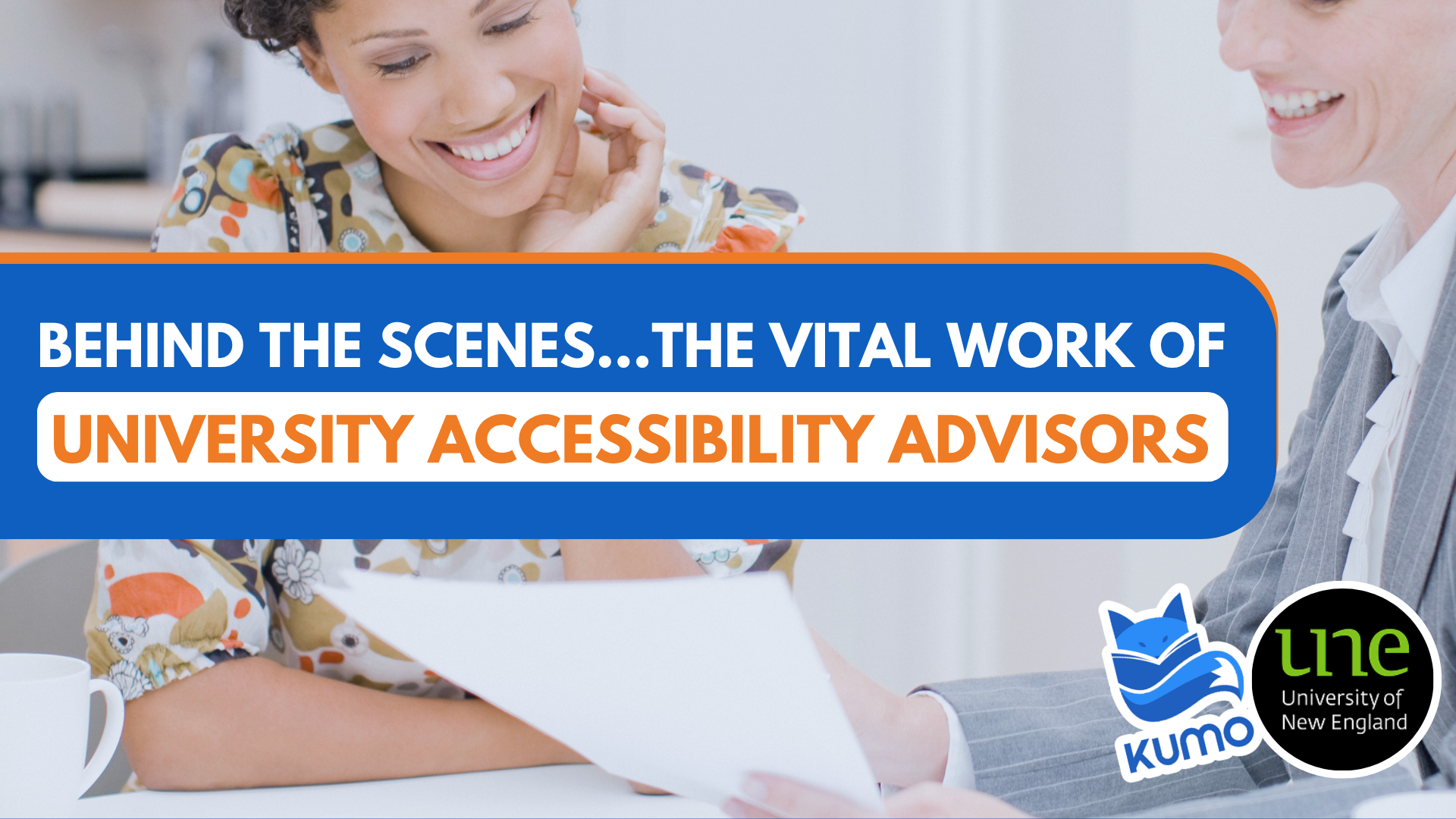
Behind the Scenes…The Vital Work of University Accessibility Advisors
How Georgia and the Student Accessibility and Wellbeing Office (SAWO) are transforming student support through expert care and proactive inclusion.
In the bustling world of higher education, teams of dedicated professionals work behind the scenes to make sure every student has the chance to thrive. At the University of New England (UNE), the Student Accessibility and Wellbeing Office (SAWO) is doing just that, combining practical student support with forward-thinking strategies that shape a more inclusive campus. This article takes a closer look at what accessibility advising really looks like at UNE, through the lens of the team’s collective approach and Georgia’s day-to-day experience as an Accessibility and Wellbeing Advisor.
The SAWO team works in two distinct but interconnected modes. On student-facing days, they become a lifeline for learners, meeting them through phone calls, Zoom sessions, or in-person conversations. “Students really like the personal aspect,” Georgia explains, highlighting how these one-on-one interactions help students work out where to start and how to put their best foot forward.
But it’s the project days that show the strategic depth of the team’s work. Rather than simply reacting to individual challenges, the SAWO team takes a step back to look at the bigger picture, using student data and lived experiences to anticipate needs before they escalate. These project days are relatively new, but they mark a fundamental shift in how UNE is approaching inclusion.
On these days, Georgia works closely with her colleagues to identify patterns in student wellbeing: how overwhelm peaks during exam season, what times of year students are most likely to reach out, and which subjects consistently see higher numbers of students requiring support. They also analyse trends such as enrolment spikes from neurodivergent students, particularly those with ADHD, and explore what resources need to be allocated to ensure these students feel set up to succeed.
This proactive, upstream approach means UNE is not only better prepared when demand surges but is also able to build equity into its systems. By anticipating needs, whether it’s offering additional resources during high-stress periods or directing targeted support toward the subjects that demand it most, Georgia and her team ensure that vulnerable students don’t just survive university, but have the opportunity to thrive.
When I asked Georgia if any success stories stood out to her, one in particular came to mind. A student who had been studying part-time for seven years while raising her daughter was juggling immense pressures, family responsibilities, academic demands, and unexpected personal hurdles. Despite her determination, the weight of it all eventually became too much.
The turning point came when she admitted she wasn’t coping and reached out for help. From that moment, Georgia worked closely with her to ease the burden, remove unnecessary pressure, and create space for her to focus on what mattered most. The result was remarkable: the student graduated with an almost perfect GPA of 6.7 out of 7.
The best bit was that she said she put her hand up and said she needed support,” Georgia reflects. “I don’t want people to thank me at the end of the day. It is their life, and my role is to walk the path with them.
Holding a Master of Social Work (professional qualifying) and having worked at UNE for over six years, and in her current role for over a year, Georgia has witnessed significant changes in how neurodivergent students, particularly women, understand and advocate for themselves. She's observed how awareness of gender differences in neurodivergent conditions has empowered students to stop masking and embrace authentic self-expression. "The experiences I am seeing are just not the same as what is being advertised," she notes about neurodivergent women's experiences, highlighting the importance of individualised support that moves beyond stereotypes and assumptions.
This belief in moving beyond assumptions also shapes how Georgia approaches her day-to-day work. For someone who "loves to multitask to the point of absurdism," she finds both her greatest joy and biggest challenge in the same place: the necessity of slowing down and being fully present with students. Working with individuals ranging in age from 17 to 75 requires constant adaptation and the ability to build rapport across vastly different life experiences and needs. It’s this ability to pause, listen, and adjust that allows her to support each student on their own terms.
At the heart of Georgia’s vision is a deep wish for society to strip away preconceptions altogether. If she could wave a magic wand, she’d give everyone temporary amnesia about disabilities and differences. "No one would know what supports they require or if they might have a disability," she muses. For Georgia, this thought experiment isn’t about erasing identity but about reimagining how advocacy and support might look if they were built purely on universal human needs, rather than on labels or assumptions.
For students who may hesitate to reach out, the UNE Student Accessibility and Wellbeing Office offers both practical and emotional guidance. As Georgia reminds students, “If you are nervous or scared, sometimes it is a good idea to do that thing anyway.” It’s a philosophy that reflects the team’s commitment to creating a safe, supportive space where students can take that first step without fear of judgment.
The team’s approach is flexible by design: some students need just one conversation, while others benefit from ongoing check-ins. “I will meet you where you’re at,” Georgia explains, a sentiment that captures the ethos of the whole team.
What sets UNE apart is the way individual care is matched with systemic thinking. The team not only supports students in the moment but also looks at broader patterns, how stress peaks around exams, which subjects regularly see higher demand for support, and how enrolments from neurodivergent students, particularly those with ADHD, continue to grow. These insights allow them to anticipate needs and shape resources to foster long-term inclusion.
This dual focus; immediate care and strategic change, represents a new generation of accessibility support. The SAWO team is not just responding to challenges, they are reshaping the institution to embrace diversity and inclusion at every level.
As Georgia puts it, “It is not your job as a student to make me feel more comfortable, it is my job to work out boundaries and articulate them with you.” It’s a student-first philosophy that runs through the entire team’s work, one that is helping build a university culture where every learner feels seen, supported, and set up to succeed.
At UNE, Georgia is just one part of a dedicated Accessibility and Wellbeing team that is redefining what support can look like in higher education. Together, they blend empathy with strategy, offering students immediate guidance while simultaneously shaping systems to meet evolving needs. Their work demonstrates that accessibility isn’t just about responding to challenges, it’s about anticipating them, creating equitable opportunities, and fostering an environment where every student can thrive.
By combining personal connection, expert care, and proactive thinking, the Student Accessibility and Wellbeing Office is setting a new standard for inclusion in universities. Their approach shows that when accessibility is embedded at both the individual and systemic level, students don’t just survive their studies, they flourish, empowered to reach their full potential.
